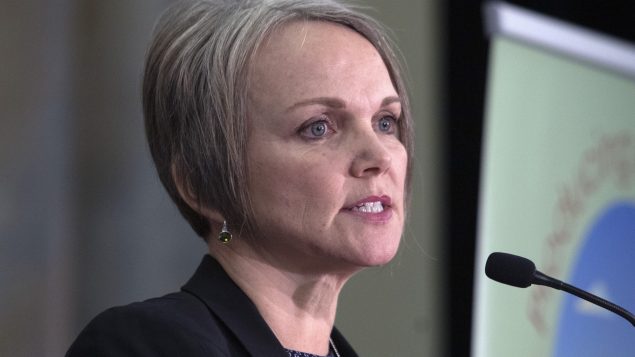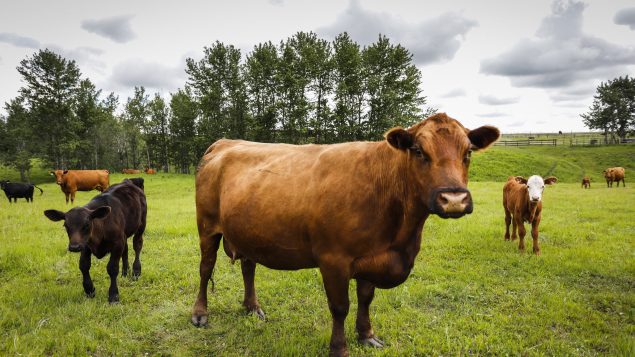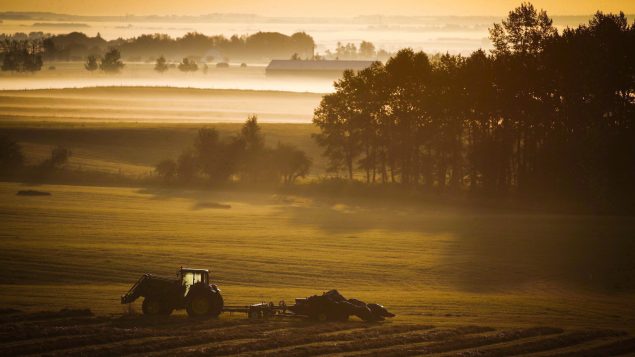Canada’s domestic food supply needs to be the federal government’s highest priority following healthcare in the fight against the COVID-19 pandemic, says the Canadian Federation of Agriculture (CFA).
Mary Robinson, president of the CFA, which represents more than 200,000 farmers across the country, says the agricultural and food producing industries in Canada are facing unprecedented challenges due to the pandemic.
Speaking at a virtual press conference on Thursday, Robinson warned that without immediate assistance from the federal government, the Canadian agriculture sector cannot ensure “domestic food supply will remain secure for the immediate and long-term benefit of all Canadians.”
‘At a tipping point’

Mary Robinson, President of the Canadian Federation of Agriculture takes part in a press conference, Tuesday, Feb. 25, 2020 in Ottawa. She warned on Thursday that Canada’s agricultural sector is a tipping point because of the COVID-19 pandemic. (Fred Chartrand/THE CANADIAN PRESS)
While the CFA doesn’t want to create panic, it would be “irresponsible not to sound the alarm” about the realities Canadian farmers are facing, she said.
“Agriculture, the foundation of our overall food supply is, at this very moment in time, at a tipping point,” Robinson said in a statement.
“If we do not, as a nation, address the rising challenges immediately, Canadian consumers could see a decrease in the amount and variety of food at their local grocery stores as well as higher prices, in the months ahead.”
In addition to alarming uncertainty in their markets, many Canadian farmers are facing labour shortages and don’t have enough workers to begin planting a new crop, Robinson said.
Labour was already a critical issue before the pandemic and has now escalated to the point that both farmers and food processors are worried that even if planting does proceed, harvesting and processing may not be possible without sufficient labour, she added.
“We face the possibility that crops will rot in the fields, as is now happening in other countries,” Robinson said.
Canadian farmers are also dealing with significantly increased costs associated with purchasing the necessary personal protective equipment for their workers, she added.
In addition, due to meat processing plant closures, farmers are being forced to keep and feed their livestock for an extended period of time, Robinson said.
Ottawa working to support food processing plants

Agriculture Minister Marie-Claude Bibeau responds to a question during Question Period in the House of Commons, Monday April 29, 2019 in Ottawa. Bibeau is not worried about food shortages overall but acknowledging really challenges in the industry. (Adrian Wyld/THE CANADIAN PRESS)
Deputy Prime Minister Chrystia Freeland said Thursday the federal government is working on ways to support Canada’s food processing plants during the COVID-19 pandemic in response to concerns about labour shortages.
“I am so grateful to all of our farmers and ranchers and food processors, but you’re right that the coronavirus poses particular challenges to food processing facilities because of the dangers of contagion there,” Freeland said during her briefing with reporters.
“That is something that our government has been working on, that I’ve been personally focused on over the past few days.”
Cases of COVID-19 have been confirmed at three meat packing plants in the Western province of Alberta, according to the union that represents plant workers.
Meanwhile, the Olymel hog slaughter and cutting plant in Yamachiche, in the French-speaking province of Quebec, reopened Tuesday after shutting down for two weeks following an outbreak among employees there.

Cows and their calves graze in a pasture on a farm near Cremona, Alta., Wednesday, June 26, 2019. Many Canadian farmers are being forced to keep and feed their livestock for an extended period of time because of meat processing plant closures due to the pandemic. (Jeff McIntosh/THE CANADIAN PRESS)
Agriculture Minister Marie-Claude Bibeau said the government has set up a meat and poultry working group to pursue a national approach to the problem. She called the people working in meat processing plants “absolutely essential for us to maintain a stable food supply as we tackle this pandemic.”
“The government of Canada is aware that some meat processing plants are reducing slaughter capacity or temporarily closing due to impacts of COVID-19, which is causing a backup of live animals on farms across the country,” Bibeau said in a statement to CBC News.
“During these unprecedented times, the meat industry is adapting to the pressures on the supply chain and ensuring prudent management, including for the welfare of people and animals. Canada remains committed to working with U.S. officials to facilitate our integrated supply chains and ensure that goods continue to flow.”
With files from CBC News







For reasons beyond our control, and for an undetermined period of time, our comment section is now closed. However, our social networks remain open to your contributions.